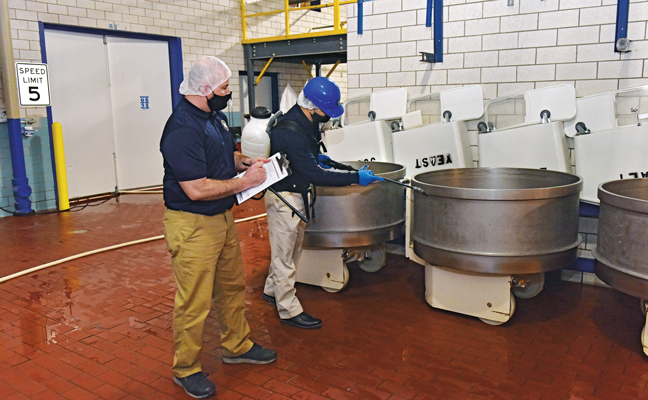
RK Environmental Services (RKE) Regional Operations Manager Chris Lazo, left, fills out a report as RKE Virucidal Program Service Specialist Johnny Echeverria begins to disinfect commercial mixing equipment at an account. PHOTO: FRED MILLER PHOTOGRAPHY
Four million dollars.
That’s what RK Environmental Services (RKE) generated with its Virucidal Program Service (VPS) last year.
“It was our saving grace in 2020,” says Hank Hirsch, BCE, founder and CEO of the Westwood, N.J.-based company. “We were sure the pest control revenue hit we took when COVID-19 hit would affect our head count, but the exact opposite happened: We brought on 12 new employees and laid off zero. It was our best year, in spite of it being an awful year otherwise.”
The coronavirus pandemic prompted more pest control companies to offer disinfecting and sanitizing services. To help readers do their homework, Pest Management Professional (PMP) interviewed the segment’s longtime leaders, such as RKE, as well as newcomers, to gather intel on obstacles, opportunities, trends and tips. The bottom line? Disinfecting and sanitizing services fit hand-in-glove with pest control, and will be in demand even after COVID-19 fades into history.
PANDEMONIUM STRIKES
RKE provides integrated pest management (IPM) services for food, biotechnology and pharmaceutical accounts throughout the eastern and central U.S. and California. Hirsch clearly recalls the Friday the 13th (March 13, 2020) when a group of his employees showed up in his office “in full panic mode” over the pandemic gaining steam.
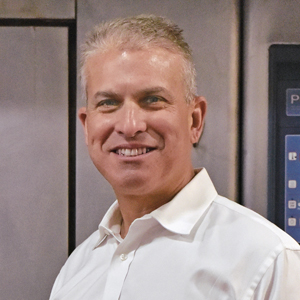
Hank Hirsch, BCE. PHOTO: FRED MILLER PHOTOGRAPHY
“We can’t work effectively, we don’t think it’s safe and we’re not going in there,” they told him. “Clients won’t even let us come in.”
Hirsch went home with a heavy heart, deep in thought. “I knew I had to work my way back from the worst-case scenario,” he recalls. “On Saturday, I was sitting there, drafting all sorts of scenarios, with cable news on in the background.”
Then inspiration hit, courtesy of his TV screen: “I was watching airline workers sanitize airplanes between flights. They had little misters, fogging with disinfectant. I thought, ‘Maybe we can do something with this. We have fogging equipment for space treatments already in inventory.’”
Hirsch began researching the possibilities, knowing many of his industrial plant clients already had sanitation staffs for tasks such as cleaning and inspecting conveyor belts.
He thought RKE might be able to perform treatments more quickly, and include the entire plant. After more research and a phone call to his insurance broker, who was able to put a policy in place with a carrier that specializes in covering environmental companies, Hirsch figured out a supply chain and an overall strategy, and VPS was born.
“On the morning of Tuesday, March 17, we launched VPS,” he adds. “Our phones were ringing off the hook by that afternoon. Our sales team couldn’t get regular meetings in the field, so they transitioned to inside sales for VPS.”
Not only did RKE salvage the last two weeks of March 2020, but April of last year was its best sales month ever. Once the pest management industry was officially deemed essential on March 19, 2020, business boomed.
“We turned around 95 percent of the clients who initially said don’t come, once we explained we were essential workers,” he says. While RKE’s food-processing customers that catered to restaurants, schools and airlines took a hit, retail and healthcare were buoyant, thanks to the VPS program.
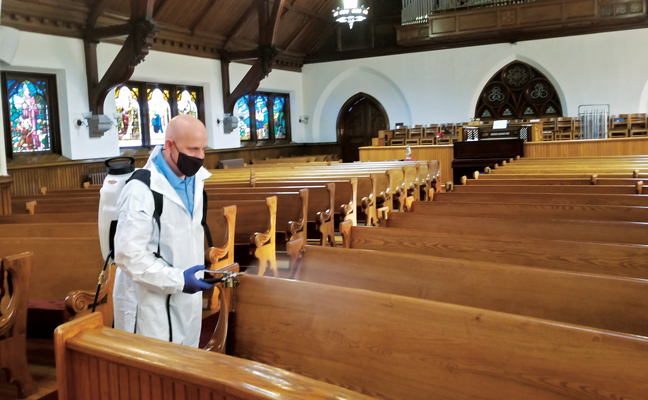
In April, Western Pest Services, a Rollins company, donated its Western PurClean service to the First Presbyterian Church of Rutherford, N.J., so the congregation could again meet in person. Disinfection donations like this have become the norm for Western, which has also worked with local firehouses and Boy Scout troops. PHOTO: WESTERN PEST SERVICES
ONE YEAR OF EXPERIENCE
In 2020, Versacor Enterprises was among several firms PMP reported as starting up a disinfection service. Based in Southlake, Texas, the company has offices throughout Texas, Oklahoma, Louisiana, Arkansas, Missouri and Kansas. When we checked in with President Jason Eicher this spring, he confirmed the foundation of the offering was the same 12 months later, thanks to a lot of homework being done before launch.
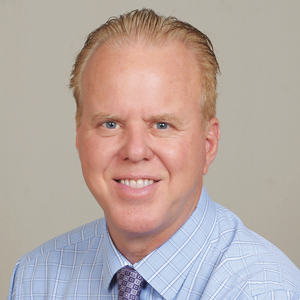
Jason Eicher
“We didn’t need to hire additional staff specifically for this service, but we did train select individuals in each branch to perform it on a regular basis,” Eicher adds, noting it really took off in the second quarter of 2020. The service then increased fairly rapidly for the rest of the year, and accounted for about half of the commercial pest solutions firm’s new sales revenue in 2020.
Chris Snyder, president of Hellertown, Pa.-based Quest Termite & Pest Management, has been the volunteer Fire Chief in Lower Saucon Township, Pa., for more than 25 years — and was able to use that experience to his advantage when launching a disinfection service.
“Our training with respirators and infectious disease came into play,” Snyder explains. “Emergency responders understand the risk associated with infection, and are prepared to take the necessary steps to protect themselves and anyone else they come in contact with. I am fortunate to have a close team in the fire service industry that wanted to make a difference.”
In addition to select members of Quest’s pest control crew, several of Snyder’s firefighter colleagues stepped up for training for the company’s disinfection offering. Training consisted not only of product use and technique application, but also customer service.

Chris Snyder
“We educated them on the protocols we use that we consider ‘above and beyond’ just spraying surfaces and letting them dry naturally, and how to communicate that to customers,” Snyder says. “Anyone who was not already on our payroll was added as a part-time employee of Quest, and we continue to utilize their skills in the disinfecting world a year later.”
With a primarily residential clientele, Quest’s pest, termite and wildlife control teams were “busier than ever” in 2020, Snyder says. While focused on exterior services only for much of the pandemic, “overtime and even double-time was offered when work was available.”
Rentokil, which is based in Camberley, England, and has North American headquarters in Reading, Pa., drew on company hygiene expertise worldwide to roll out its disinfection service.
“Early last year, Rentokil offered manual surface disinfection to those essential industries during the pandemic, expanding to help businesses reopen and welcome customers back safely,” reports Chuck Stanec, the firm’s director of product and innovation. “From there, we leveraged our existing drone service capabilities, initially used for aerial vector spraying, to perform drone disinfection for larger facilities, such as sports arenas and entertainment venues.”
Rentokil was able to get a jumpstart on the use of drones for disinfecting, Stanec says, because several of its North American businesses employ licensed pilots for mosquito control using aerial applications. “We were able to harness their experience for drone disinfection,” he adds.
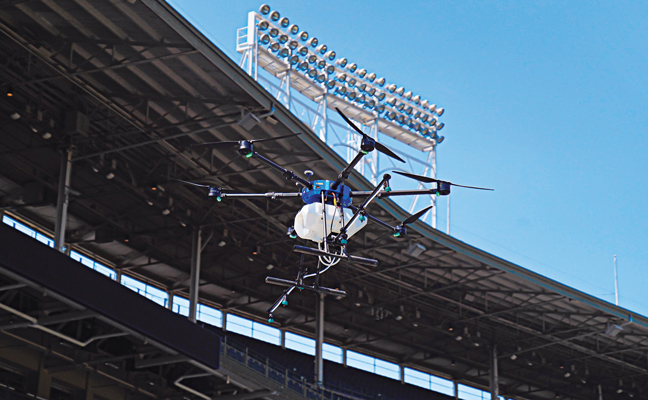
Marlins Park, home of the Major League Baseball team the Miami Marlins, made headlines this spring when Rentokil used drones to disinfect the stadium. Florida Pest Control, a Rentokil company, is the Marlins’ official pest control provider. PHOTO: RENTOKIL
CHALLENGES TO OVERCOME
RKE’s Hirsch notes that sourcing personal protective equipment (PPE) was a challenge at first, but his 10 regional managers soon turned it into a group effort.
“I didn’t even ask them to do this, but the guys went to hardware stores in their local markets and bought whatever they could get — gloves, face shields, masks, Tyvek suits. They shared the wealth among all of our offices and we didn’t skip a beat,” he says.

Chuck Stanec
Rentokil’s Stanec points out that when the National Pest Management Association (NPMA) assembled a Disinfection Services Task Force in early 2020, it was a game-changer because it pooled industry information.
“The task force developed resources for member companies that ranged from licensing, and product and equipment selection, to insurance and PPE,” he says, adding that much of the information is available at PestControlCoronavirus.com/disinfection-services.
Western Pest Services, a Rollins company, launched its trademarked Western PurClean service in May 2020. Shannon Sked, BCE, director of fumigation for the Parsippany, N.J.-based firm, notes one of the biggest hurdles when rolling out the service was taking the time to do it correctly, right from the start.
“There was a lot of demand for accurate information, and the public was confused about what disinfection is, what makes one program different from another,” Sked recalls. “Accurate information was critical, because customers were relying on it to make informed decisions. As with everything on the internet, information is easily accessible, but that doesn’t mean all of it is true. As the experts, we wanted to be sure we were sharing accurate information. This is a ‘hindsight-is-20/20’ situation, though: We took the time needed to get the correct information; we just wish we had it sooner.”
For Versacor, pricing the disinfection service was a concern initially. “It took us a couple of months to hone our pricing strategy, to better handle the various sizes of facilities we were disinfecting and to stay competitive in the market,” Eicher says.
Even so, Eicher says Versacor’s disinfection service returned good margins because of the low barriers to entry. “Buying the disinfectant in concentrate form is relatively inexpensive, and we were able to use existing delivery equipment with just a couple of modifications,” he explains. “By providing the service to existing clients, we contained costs.”
Quest’s Snyder says having formal policies in place ensures employees are offering consistent, informed service and communication to customers. “We instituted a COVID-19 manual and safety policy that all employees were required to read and sign. Similar language is sent to our customers for review and signature prior to service,” he explains, noting that both documents were prepared (and are frequently updated) based on the latest guidelines from both the Centers for Disease Control and Prevention, and the Occupational Safety and Health Administration. As of mid-April, he adds, “We still require employees to check in at the start and end of each workday for a questionnaire and temperature check.”
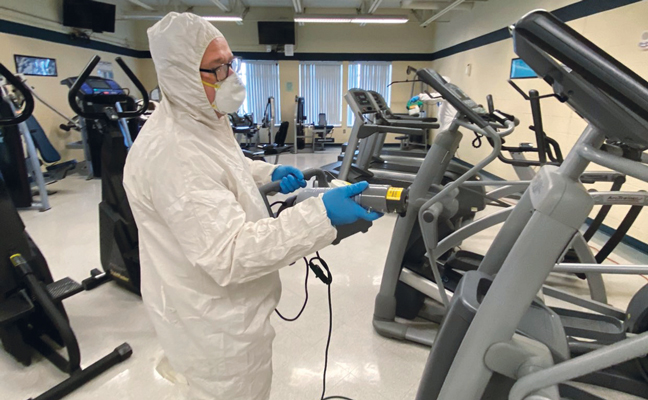
Quest Termite & Pest Solutions’ Chris Snyder has taken on new clients, like this gym, thanks to
the disinfection service offering. PHOTO: QUEST TERMITE & PEST SOLUTIONS
SPREADING THE WORD

Shannon Sked, BCE
Snyder admits Quest had the upper hand when the pandemic hit because it was already offering pest, sanitation and disinfection services to a funeral home owned by the local mayor. “He, too, is customer-centric, offering services with attention to detail,” Snyder says. “I partnered with him to put together an action plan to identify the best way for his company to continue to offer funeral services.”
By fine-tuning Quest’s service for the funeral home, word got out that the company could provide peace of mind for a variety of accounts, such as construction jobsites, ambulances, manufacturing facilities, radio and TV news vans, machine shops making products for government facilities, and more.
“Many of these locations, we did not originally perform pest management for,” Snyder says. “But we are still servicing them weekly, and in some cases several times a week.”
For RKE, existing customers told colleagues about the VPS program, and business mushroomed, Hirsch says. At the height of demand last year, RKE based VPS pricing on square footage of the facility, because there was no time to perform in-person assessments. That has since morphed into tier package pricing.
“All of our service professionals talked about it at every account, but we really got business through social media, with LinkedIn, Facebook and Twitter in particular,” Hirsch says. “We haven’t spent any extra money on advertising VPS.”
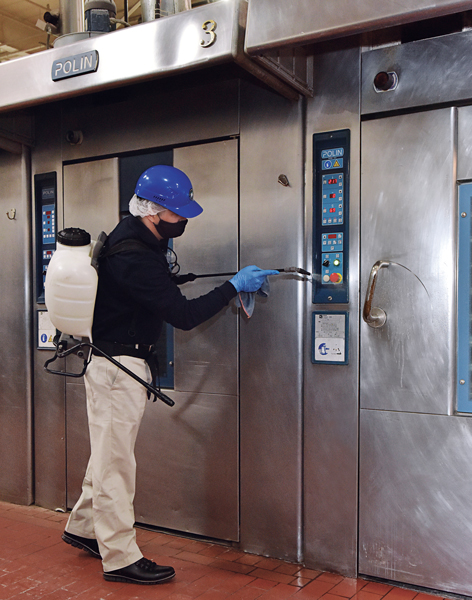
Johnny Echeverry, a Virucidal Program Service specialist for Westwood, N.J.-based RK Environmental Services, disinfects equipment controls at a commercial bakery. PHOTO: FRED MILLER PHOTOGRAPHY
LOOKING AHEAD
At press time, as the pandemic seems to be winding down in mid-2021, Hirsch says many of his VPS techs have transitioned to IPM roles. Account executives are back in the field selling. VPS is still a component for RKE, but it can recede into an add-on service, instead of the primary program keeping the company afloat.
Today, he says, “VPS is not as high of a percentage of our revenue, but it’s still worth offering.”
Sked says Western Pest Services sees disinfection service as being an integrated part of customers’ sanitation programs for years to come, albeit “with a few small changes in the delivery of the program. Food-borne pathogens transmitted by insects and rodents are a part of the public health and safety aspects we offer our customers. Our marketing will pivot based on being an integrated part of our customers’ sanitation needs.”
Rentokil’s Stanec agrees. “Many other dangerous viruses, bacteria and pathogens still can be spread via surfaces, including the influenza virus, E. coli and Staphyloccocus aureus,” he says. “The pandemic only brought more awareness around health, hygiene and safety. Customers and employees will expect businesses to provide safe environments that will extend beyond hand sanitizers and disinfection to overall cleanliness and wellness. The public will seek out brands that meet their expectations, provide confidence in safe experiences through visual cues, and take every opportunity to re-earn their trust.”
Read more:
Nice article! BBBK Disinfect is still providing this service, too. We have multiple schools we service twice a week. I believe this service is here to stay.